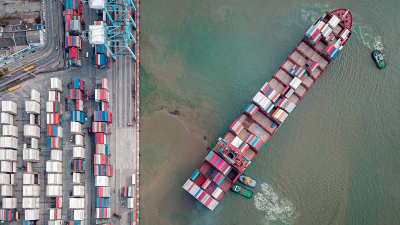The scale of the threat: economic and trade impacts
If the lockouts proceed as planned, they will mark the first time in Canadian history that both CN and CPKC have simultaneously halted operations due to labor disputes. This could have devastating effects on the shipment of key Canadian exports, including food grains, beans, potash, coal, and timber. These commodities are crucial not only for domestic use but also for international trade, meaning the economic ramifications would extend far beyond Canada’s borders.
The rail stoppage would also disrupt the transportation of other essential goods such as petroleum products, chemicals, and automobiles. Given that rail is a critical component of North America's integrated trade network, the potential halt in Canadian rail services could create significant delays and bottlenecks at key U.S. rail and shipping hubs, including Chicago, New Orleans, Minneapolis, and Memphis. The situation is further complicated by CPKC’s extensive network, which connects Canada with both the eastern and western coasts of Mexico, making this a truly continental issue.
Core issues: labor disputes and safety concerns
At the center of the conflict between CN and the Teamsters union is a contentious provision regarding worker relocation. CN has proposed a forced relocation clause that would require workers to move across Canada for months at a time to address labor shortages. This provision has been met with strong resistance from the union, which argues that it would severely disrupt the lives of its members. Despite four separate offers made by CN this year concerning wages, rest periods, and labor availability, the union contends that the company’s demands are unreasonable and would negatively impact worker well-being.
On the other hand, the dispute between CPKC and the union is focused on safety issues. The union accuses CPKC of attempting to undermine the collective agreement by removing critical fatigue provisions, which would result in longer working hours for train crews, thereby increasing the risk of accidents. CPKC, however, maintains that its offer upholds all current work rules, complies fully with new regulatory requirements for rest periods, and does not compromise safety in any way.
The Teamsters union has responded to these disputes by issuing a 72-hour strike notice to CPKC, signaling its intention to take action if the lockout proceeds. The union’s president, Paul Boucher, has stated that the strike notice is necessary to defend the rights and safety of the union’s members, emphasizing the high stakes of the ongoing negotiations.
Potential government intervention and broader implications
As the situation escalates, there have been calls from business groups for the federal Liberal government to intervene and prevent the economic fallout of a rail stoppage. However, the government has so far resisted these appeals, expressing a preference for the companies and the unions to resolve their differences through negotiation. This hands-off approach places additional pressure on both sides to reach an agreement, but it also raises concerns about the potential for prolonged disruption if no resolution is found.
The broader implications of this dispute are significant. A prolonged stoppage could severely strain Canada’s economic recovery, particularly in the wake of global supply chain disruptions caused by the COVID-19 pandemic. Furthermore, the impact on North American trade could be substantial, as delays in the shipment of goods ripple through supply chains that are already under pressure.
source: CNN


 Are you thinking about investing in real estate in Albania? Looking for a safe and profitable opportunity? Balfin Real Estate
Are you thinking about investing in real estate in Albania? Looking for a safe and profitable opportunity? Balfin Real Estate The issue of tariffs has gained significant attention in Canada following months of warnings from U.S. President Donald Trump. Tariffs
The issue of tariffs has gained significant attention in Canada following months of warnings from U.S. President Donald Trump. Tariffs The Canadian government has taken decisive action following new U.S. tariffs. Prime Minister Justin Trudeau announced immediate countermeasures after President
The Canadian government has taken decisive action following new U.S. tariffs. Prime Minister Justin Trudeau announced immediate countermeasures after President

